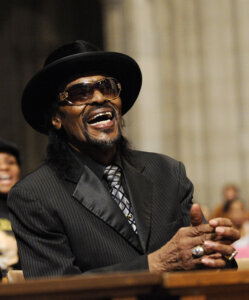This video is no longer available.
This year marks the 10th anniversary of the death of Chuck Brown, and even today, his influence on the District lives on. The singer, guitarist and songwriter remains one of the city’s most recognizable figures — he’s seen on murals; he’s the namesake of a memorial park in Northeast D.C., and he’s celebrated every year on Chuck Brown Day.
This Saturday will be the eighth year that D.C. has honored “The Godfather of Go-Go” with the Chuck Brown Day festival, hosted at Chuck Brown Memorial Park, at 2901 20th St. NE.
Some of the featured musical artists that will perform at this year’s free event include Doug E. Fresh, Rare Essence, UCB, DJ Kool and the surviving members of the Chuck Brown Band. Learn more about this year’s event in WTOP’s preview of Chuck Brown Day.
With hits such as “Bustin’ Loose,” Brown helped create the genre known as go-go. The single was heard across the nation, spending four weeks on Billboard’s R&B singles charts in 1979. It is one of the most sampled go-go songs ever, including on Grammy winner Nelly’s 2002 song, “Hot in Herre.”
Brown developed the genre from the sounds he heard in the churches he went to as a child, borrowing the call-and-response tradition and infusing it with influences from funk, Latin and other genres, while adding heavy percussion.
The genre has since become so emblematic of the District that Mayor Muriel Bowser signed a bill in February 2020 to make go-go the official music of D.C. At the time, Bowser said, “Today we’re going to let the world know that go-go is D.C. Go-go is our native language.”
‘Just goes and goes’
Go-go historian and musician Kevin “Kato” Hammond, the owner of Take Me Out To The Go-Go, which comprises a magazine and online radio station, told WTOP, “When he really learned how to play, it was while he was locked up, and a friend made a guitar for him.”
Brown was born 86 years ago next Monday. His teens and early 20s were turbulent times, including running away from home. He served three years in D.C.’s Lorton Penitentiary for assault, though Brown said he acted in self-defense. A fellow inmate made him a guitar, which inspired Brown to teach himself to play and reconnect with his love of music. In the early 1970s, he put together the Soul Searchers band, whose sound has since influenced local bands such as Experience Unlimited and Rare Essence, among many others.
Hammond said Brown came up with one of go-go’s defining concepts: “When they finished playing a song, instead of the band stopping and then they go into the next song, the drums and the percussion section would immediately go into the beat of the next song they’re going to play.”
“Chuck’s influence was immeasurable,” said local journalist Alona Wartofsky, who has written about D.C.’s go-go scene for over 30 years. “Not only did he uplift thousands of people with his music, but by creating this genre, he created a whole culture.”
Wartofsky is currently co-authoring a book on go-go culture with Hammond and Charles Stephenson, which will be published by Georgetown University Press in 2024. She describes Brown as both a “friend” and “someone I admired,” plus someone with a “huge heart.”
“The thing about Chuck that was really remarkable was that he could mix in with anyone, and he could respect and understand anyone, and he brought that respect and love to his audiences, which is part of why I think everybody loved him so much back,” said Wartofsky.

D.C. Council member Robert White told WTOP go-go music defined his youth: “I frankly learned some things from his showmanship. Being at his concerts and seeing him play so late into the night because people showed up to see him, despite at this point being in his 70s, was a note to me about work ethic and appreciation for the people who come out to support you.”
There are “countless” go-go bands today in D.C., and several subgenres at this point, said Wartofsky. “He was very open to the music evolving over time, which I think is really the mark of a true innovator — that you’re able not just to say ‘It has to sound like the way I did it,’ but to also be able to embrace all of the ways the music has evolved.”
Brown passed away at 75 on May 16, 2012, at Johns Hopkins Hospital in Baltimore. Brown once said go-go got its name because “the music just goes and goes.” Similarly, Brown’s influence continues unfaltering, forever heard from passing automobiles, businesses and radio stations.
“No one will forget Chuck,” said Hammond. “Chuck Brown is to go-go music what Bob Marley is to reggae.”
White said, “I’ve been really happy to see Chuck Brown’s legacy live on in the District through the park dedicated to him, through Chuck Brown Day, through his music that I still hear around the city. And so, at least at this point, his legacy is still very much alive and rich in the District of Columbia.”








